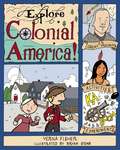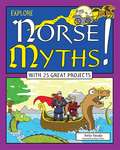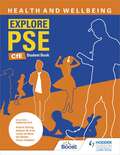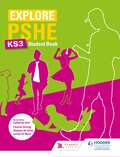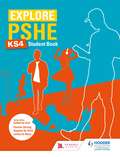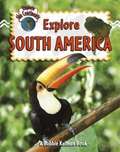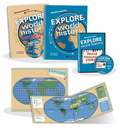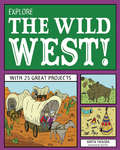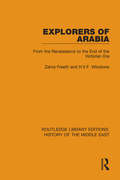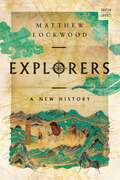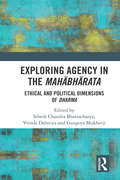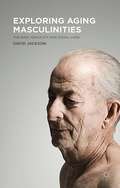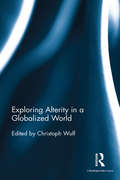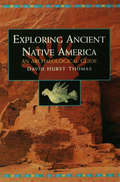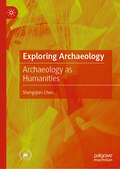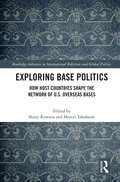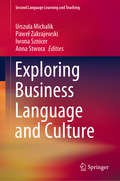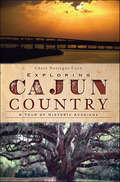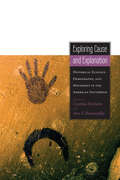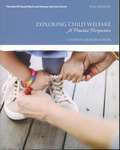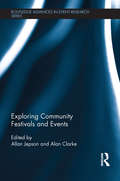- Table View
- List View
Explore Colonial America!
by Verna Fisher Bryan StoneIn Explore Colonial America!, kids ages 6-9 learn about America's earliest days as European settlements, and how the colonists managed to survive, build thriving colonies, and eventually challenge England for independence.How did the colonists build homes, feed and clothe themselves, and get along with the Native Americans who were already here? This accessible introduction to the colonial period teaches young children about the daily lives of ordinary colonists and offers fascinating stories about those who helped shape the emerging nation. Activities range from creating a ship out of a bar of soap and building a log home out of graham crackers and pretzels to making a wampum necklace. Projects are easy-to-follow, require minimal adult supervision, and use primarily common household products and recycled supplies.By combining a hands-on element with riddles, jokes, fun facts, and comic cartoons, kids Explore Colonial America!, and have a great time discovering our nation's founding years.
Explore Norse Myths!
by Anita YasudaThe stories of Norse myths and legends are a terrific introduction to Viking culture, history, science, and traditions, which thrived in Scandinavia from the eighth to the eleventh centuries. But who were the Norse, who left their homelands in Denmark, Norway, and Sweden to trade, raid, and explore around the world? In Explore Norse Myths! With 25 Great Projects, young readers discover the remarkable people and mythical creatures of old. Learning about Norse myths means unearthing the origin of Viking beliefs, as well as exploring their ships, tools, and other technology that flourished for nearly 450 years. Along the way, kids will read how Norse myths helped explain the natural world from thunder to the seasons, from creation to death. They may be surprised at how Norse myths continue to influence modern culture in the form of movies and books, including the new series by Rick Riordan. Readers will read Norse stories and learn about the adventures of real Norse explorers, including Erik the Red and Leif Erikson. Through a mixture of fun facts, trivia, jokes, comics, and hands-on activities, kids will dig up Scandinavia's past and sail the seas along with the gods and giants in Explore Norse Myths!
Explore PSE: Health and Wellbeing for CfE Student Book
by Ian Geddes Calum Campbell Stephen De Silva Pauline Stirling Lesley de MezaSyllabus: CfE (Curriculum for Excellence, from Education Scotland) and SQALevel: BGE S1-3 (Second, Third and Fourth Levels), National 4 and National 5Subject: PSE (Health and Wellbeing)Empower Scotland''s young people to feel prepared for the opportunities and challenges of adult life.Exploring topics such as mental health, sex, identity, community and planning for your future, this book develops students'' life skills, knowledge and resilience as they learn about themselves and others.> Create a supportive environment where sensitive issues can be discussed confidently and constructively, using the book to provide stimulus material and structure> Follow an active learning approach with starter activities to get students thinking, visual sources and written extracts to encourage conversations, and hundreds of activities for individual, pair and group work> Monitor students'' progress through learning outcomes for each lesson/series of lessons and numerous activities that create opportunities for assessment for learning and evidence of achievement> Suit your students and your timetable, with topics that can be covered in any order and double-page spreads that can be delivered across one or two lessons> Rest assured that all content in the book is linked to the CfE Benchmarks and Experiences & Outcomes for Health and Wellbeing: Personal and Social Education, as well as the GIFREC and SHANARRI principles
Explore PSE: Health and Wellbeing for CfE Student Book
by Ian Geddes Calum Campbell Stephen De Silva Pauline Stirling Lesley de MezaSyllabus: CfE (Curriculum for Excellence, from Education Scotland) and SQALevel: BGE S1-3 (Second, Third and Fourth Levels), National 4 and National 5Subject: PSE (Health and Wellbeing)Empower Scotland's young people to feel prepared for the opportunities and challenges of adult life.Exploring topics such as mental health, sex, identity, community and planning for your future, this book develops students' life skills, knowledge and resilience as they learn about themselves and others.> Create a supportive environment where sensitive issues can be discussed confidently and constructively, using the book to provide stimulus material and structure> Follow an active learning approach with starter activities to get students thinking, visual sources and written extracts to encourage conversations, and hundreds of activities for individual, pair and group work> Monitor students' progress through learning outcomes for each lesson/series of lessons and numerous activities that create opportunities for assessment for learning and evidence of achievement> Suit your students and your timetable, with topics that can be covered in any order and double-page spreads that can be delivered across one or two lessons> Rest assured that all content in the book is linked to the CfE Benchmarks and Experiences & Outcomes for Health and Wellbeing: Personal and Social Education, as well as the GIFREC and SHANARRI principles
Explore PSHE for Key Stage 3 Student Book
by Stephen De Silva Pauline Stirling Lesley de MezaDevelop your students' skills and understanding of PSHE and encourage an active learning approach, all whilst providing essential coverage of the 2020 statutory guidelines.The flexible design of this KS3 student book is compatible with whichever way your school delivers PSHE. User-friendly for both experienced PSHE Leads and for non-specialist teachers, it is packed full lesson outcomes and starter sections, as well as lot of activities students can get involved in.- Provide the right level of knowledge and understanding of PSHE education students need with this KS3 Student Book that has topic suitability for this age range- Learning outcomes at the start of every lesson, along with a short activity to introduce students to the topic and get them thinking provides an easy way in to every lesson- Source-based activities support an activity-based learning scheme that is accessible to students of all abilities
Explore PSHE for Key Stage 3 Student Book
by Stephen De Silva Pauline Stirling Lesley de MezaDevelop your students' skills and understanding of PSHE and encourage an active learning approach, all whilst providing essential coverage of the 2020 statutory guidelines.The flexible design of this KS3 student book is compatible with whichever way your school delivers PSHE. User-friendly for both experienced PSHE Leads and for non-specialist teachers, it is packed full lesson outcomes and starter sections, as well as lot of activities students can get involved in.- Provide the right level of knowledge and understanding of PSHE education students need with this KS3 Student Book that has topic suitability for this age range- Learning outcomes at the start of every lesson, along with a short activity to introduce students to the topic and get them thinking provides an easy way in to every lesson- Source-based activities support an activity-based learning scheme that is accessible to students of all abilities
Explore PSHE for Key Stage 4 Student Book
by Philip Ashton Stephen De Silva Lesley de MezaDevelop your students' skills and understanding of PSHE and encourage an active learning approach, all whilst providing essential coverage of the 2020 statutory guidelines.The flexible design of this KS4 student book is compatible with whichever way your school delivers PSHE. User-friendly for both experienced PSHE Leads and for non-specialist teachers, it is packed full lesson outcomes and starter sections, as well as lot of activities students can get involved in.- Provide the right level of knowledge and understanding of PSHE education pupils need with this KS4 Student Book that has topic suitability for this age range.- Learning outcomes at the start of every lesson, along with a short activity to introduce students to the topic and get them thinking provides an easy way in to every lesson - Source-based activities support an activity-based learning scheme that is accessible to students of all abilities
Explore PSHE for Key Stage 4 Student Book
by Philip Ashton Stephen De Silva Lesley de MezaDevelop your students' skills and understanding of PSHE and encourage an active learning approach, all whilst providing essential coverage of the 2020 statutory guidelines.The flexible design of this KS4 student book is compatible with whichever way your school delivers PSHE. User-friendly for both experienced PSHE Leads and for non-specialist teachers, it is packed full lesson outcomes and starter sections, as well as lot of activities students can get involved in.- Provide the right level of knowledge and understanding of PSHE education pupils need with this KS4 Student Book that has topic suitability for this age range.- Learning outcomes at the start of every lesson, along with a short activity to introduce students to the topic and get them thinking provides an easy way in to every lesson - Source-based activities support an activity-based learning scheme that is accessible to students of all abilities
Explore South America (Explore The Continents)
by Bobbie Kalman Molly AloianThe world's largest tropical rain forest and the world's longest mountain range are both found on the continent of South America. This beautiful new book introduces children to the fascinating physical and social geography of South America including the continent's countries; major landforms and bodies of water; and people, plants, and animals in the rain forests, grasslands, and deserts.
Explore World History
by Don Bastian Tom KinneyThe Student Book has 15 chapters divided into 3 types: Keys to History, Historical Eras, and Historical Themes. Key chapters feature World Geography, Study Tools, and Biographies. The 6 Era chapters follow a chronology from Early Humans to Modern Times. Theme chapters focus on major historical concepts, like Agriculture or Trade, and are linked to a particular era. Chapters follow a consistent format: Introduction, Vocabulary, Big Idea, Important Topics, Review, and Write About It. The simplified text is heavily illustrated and intended to be read to students who are nonreaders. Students are frequently presented with important study tools like timelines, maps, and tables.
Explore the Wild West!
by Bryan Stone Anita YasudaExplore the Wild West! 25 Great Projects, Activities, Experiments invites young readers ages 6-9 to experience the spirit of the Wild West. Kids learn about explorers who mapped the American West, Native Americans, gold miners, cowboy culture, cattle drives, Wild West legends, frontier towns, peacekeepers, lawbreakers, and much more. Through projects ranging from making a settler's soddie to mining for gold, kids develop a better understanding of the rich history of the Wild West in the 1800s.
Explorers of Arabia: From the Renaissance to the End of the Victorian Era
by Zahra Freeth H.V.F. WinstoneExploration usually demands the qualities of bravery, curiosity and organising ability. Arabia demanded more of the voyager: linguistic ability of a high order, scholarship and an imaginative temperament. It was also necessary to be able to pass as a native, if not of Arabia then of part of the Islamic world. The early explorers faced untold dan
Explorers: A New History (A Norton Short #0)
by Matthew LockwoodThe impulse to seek out new worlds is universal to humanity. Unfurling a tapestry of surprising and historically overlooked figures spanning forty centuries and six continents, historian Matthew Lockwood narrates lives filled with imagination and wonder, curiosity, connection, and exchange. Familiar icons of exploration like Pocahontas, Columbus, Sacagawea, and Captain Cook find new company in the untold stories of people usually denied the title “explorers,” including immigrants, indigenous interpreters, local guides, and fugitive slaves. He highlights female voyagers like Gudrid Far-Traveler and Freydís Eiríksdóttir, Viking women who sailed to North America in 1000 AD, and Mary Wortley Montagu, whose pioneering travels to Constantinople would lead to the development of the world’s first smallpox vaccine. Figures like Ghulam Rassul Galwan, a guide for European travelers in the Himalayas, reveal the hidden labor, expertise, and local enthusiasm behind many grand stories of discovery. Other characters, like David Dorr, a man born into slavery in New Orleans who embarked on a Grand Tour of Europe and Egypt, embody discovery and wonder as universal parts of the human condition. As Lockwood makes clear, people of every background imagine new worlds. Adventurers from every corner of the globe search for the unknown and try to understand it, remaking the world and themselves in the process. Exploration is for everyone who sets off into the unknown. It is the inheritance of all.
Exploring Agency in the Mahabharata: Ethical and Political Dimensions of Dharma
by Sibesh Chandra Bhattacharya Vrinda Dalmiya Gangeya MukherjiThe Mahabharata, one of the major epics of India, is a sourcebook complete by itself as well as an open text constantly under construction. This volume looks at transactions between its modern discourses and ancient vocabulary. Located amid conversations between these two conceptual worlds, the volume grapples with the epic’s problematisation of dharma or righteousness, and consequently, of the ideal person and the good life through a cluster of issues surrounding the concept of agency and action. Drawing on several interdisciplinary approaches, the essays reflect on a range of issues in the Mahabharata, including those of duty, motivation, freedom, selfhood, choice, autonomy, and justice, both in the context of philosophical debates and their ethical and political ramifications for contemporary times. This book will be of interest to scholars and researchers engaged with philosophy, literature, religion, history, politics, culture, gender, South Asian studies, and Indology. It will also appeal to the general reader interested in South Asian epics and the Mahabharata.
Exploring Aging Masculinities: The Body, Sexuality And Social Lives
by David JacksonThis book explores the lived, embodied experiences of aging men as a counterpoint to the weary stereotypes often imposed on them. Conventionally, in Western cultures, they are seen as inevitably in decline. The book challenges these distorted images through a detailed analysis of aging men's life stories.
Exploring Alterity in a Globalized World
by Christoph WulfThis volume develops a unique framework to understand India through indigenous and European perspectives, and examines how it copes with the larger challenges of a globalized world. Through a discussion of religious and philosophical traditions, cultural developments as well as contemporary theatre, films and media, it explores the manner in which India negotiates the trials of globalization. It also focuses upon India’s school and education system, its limitations and successes, and how it prepares to achieve social inclusion. The work further shows how contemporary societies in both India and Europe deal with cultural diversity and engage with the tensions between tendencies towards homogenization and diversity. This eclectic collection on what it is to be a part of global network will be of interest to scholars and researchers of South Asian studies, philosophy, sociology, culture studies, and religion.
Exploring Ancient Native America: An Archaeological Guide
by David Hurst ThomasFirst Published in 1999. Routledge is an imprint of Taylor & Francis, an informa company.
Exploring Archaeology: Archaeology as Humanities
by Shengqian ChenThis book looks inward to reveal and analyse problems in archaeology itself. The subject explored in this volume include: humanistic attributes of archaeology, various archaeological theory, challenges in the development of archaeology, China Archaeology paradigms and "Chinese School", responsibilities and status of archaeology in society, and prospects of Archaeology in China. With years of engagement in philosophy and theory studies, the author raised many bold questions and contributed unique and original views. While the archaeological circle remained tacit about -"Chinese School"- a term proposed by leading authority Professor Su Bingqi, the author bravely voiced that archaeology needs a "Chinese school". The "Chinese school" would facilitate both the reconstruction of cultural significance and the vying for international discourse power. The author also puts forward his thoughts on the current public archaeological fever, explaining and reflecting on the social responsibility, discourse power and how to present the archaeological discovery in a more accurate and efficient way to the public.
Exploring Base Politics: How Host Countries Shape the Network of U.S. Overseas Bases (Routledge Advances in International Relations and Global Politics)
by Shinji KawanaThis book sheds light on the mechanisms of base politics that surround US overseas military bases, comparing several countries across different regions. Analysing cases from Japan, Greenland, Germany, Italy, Turkey, Saudi Arabia, South Korea, and Singapore, the contributors paint a detailed and complex picture of the role and impact of US bases. In times of war they project military power, and in times of peace they deter the emergence of general and latent threats. Furthermore, they are used to secure access to resources, and as a means of politically and economically influencing small and mid-size countries. From the viewpoint of the countries that host them, military bases allow the host many benefits of the US security umbrella, but can cause internal problems, including accidents and noise pollution that accompany the functioning of a base, as well as constraining their own sovereignty. Military bases do not simply serve to bring America strategic and security benefits - as symbols of the hierarchical structure of the international system, they influence power relations in the entire world. An invaluable resource for scholars of International Relations with an interest in the practical and theoretical challenges of the US’s relationship with its allies.
Exploring Biological Anthropology: The Essentials
by Craig Britton Stanford John Scott Allen Susan C. AntónExploring Biological Anthropology: The Essentials combines concise coverage of the foundations of the field with modern innovations and discoveries, helping students understand, and get excited about, the discipline. Because the authors conduct research in three of the main areas of biological anthropology–the human fossil record (Susan Antón), primate behavior and ecology (Craig Stanford), and human biology and the brain (John Allen)–they offer a specialist approach that engages students and gives them everything they need to master the subject. The Fourth Edition continues to present traditional physical anthropology within a modern Darwinian framework, and includes coverage of contemporary discoveries to highlight the ever-increasing body of knowledge in biological anthropology.
Exploring Business Language and Culture (Second Language Learning and Teaching)
by Paweł Zakrajewski Urszula Michalik Iwona Sznicer Anna StworaThis book aims to present the results of research in the sphere of business language and culture, as well as the experience of pedagogical staff and practitioners concerned with broadly understood business. The highly complex nature of contemporary business environment, approached from both the theoretical and practical standpoint, does not cease to prove that research into business studies cannot be dissociated from the cultural and linguistic context. The chapters included in this book were contributed by academics and practitioners alike, which offers a balanced approach to the topic and ensures high levels of diversity together with an undeniable homogeneity. They were gathered with a view to show various aspects of business language, perceived both as a medium of communication and as a subject of research and teaching. They are concerned with business culture as well, including business ethics and representations of business in popular culture. Owing to its multidisciplinary approach, the book presents a roadmap towards successful functioning in business settings, highlighting such issues as education for business purposes, the study of language used in business contexts, the aspects of cross-cultural communication, as well as ethical behaviour based upon different values in multicultural business environments. Given its multifarious character, the book surely appeals not only to academics, but also to the interested laymen and students who wish to expand their knowledge of business studies and related phenomena.
Exploring Cajun Country: A Tour of Historic Acadiana (History & Guide)
by Cheré Dastugue CoenLouisiana's famous Cajun Country is a place where today's travelers can still experience the rich heritage and traditions that began in the eighteenth century.From foodways and folktales to music and festivals, Acadiana offers something you can't get anywhere else. Journey through this historic and unique part of the state with travel writer and historian Cher Coen as your guide Experience Cajun Country through its exceptional cuisine, area events, and historic attractions.
Exploring Cause and Explanation: Historical Ecology, Demography, and Movement in the American Southwest (Proceedings of SW Symposium)
by Cynthia L. Herhahn and Ann F. RamenofskyThis 13th biennial volume of the Southwest Symposium highlights three distinct archaeological themes—historical ecology, demography, and movement—tied together through the consideration of the knowledge tools of cause and explanation. These tools focus discussion on how and why questions, facilitate assessing past and current knowledge of the Pueblo Southwest, and provide unexpected bridges across the three themes. For instance, people are ultimately the source of the movement of artifacts, but that statement is inadequate for explaining how artifact movement occurred or even why, at a regional scale, different kinds of movement are implicated at different times. Answering such questions can easily incorporate questions about changes in climate or in population density or size. Each thematic section is introduced by an established author who sets the framework for the chapters that follow. Some contributors adopt regional perspectives in which both classical regions (the central San Juan or lower Chama basins) and peripheral zones (the Alamosa basin or the upper San Juan) are represented. Chapters are also broad temporally, ranging from the Younger Dryas Climatic interval (the Clovis-Folsom transition) to the Protohistoric Pueblo world and the eighteenth-century ethnogenesis of a unique Hispanic identity in northern New Mexico. Others consider methodological issues, including the burden of chronic health afflictions at the level of the community and advances in estimating absolute population size. Whether emphasizing time, space, or methodology, the authors address the processes, steps, and interactions that affect current understanding of change or stability of cultural traditions. Exploring Cause and Explanation considers themes of perennial interest but demonstrates that archaeological knowledge in the Southwest continues to expand in directions that could not have been predicted fifty years ago. Contributors: Kirk C. Anderson, Jesse A. M. Ballenger, Jeffery Clark, J. Andrew Darling, B. Sunday Eiselt, Mark D. Elson, Mostafa Fayek, Jeffrey R. Ferguson, Severin Fowles, Cynthia Herhahn, Vance T. Holliday, Sharon Hull, Deborah L. Huntley, Emily Lena Jones, Kathryn Kamp, Jeremy Kulisheck, Karl W. Laumbach, Toni S. Laumbach, Stephen H. Lekson, Virginia T. McLemore, Frances Joan Mathien, Michael H. Ort, Scott G. Ortman, Mary Ownby, Mary M. Prasciunas, Ann F. Ramenofsky, Erik Simpson, Ann L. W. Stodder, Ronald H. Towner
Exploring Child Welfare: A Practice Perspective
by Cynthia Crosson-TowerThe text emphasizes the practice perspective and features numerous case examples that allow students to get a real-life look at the population they will be serving. References to applicable social work competencies appear throughout the book to help guide readers in learning how the competencies apply to practice situations.
Exploring Community Festivals and Events (Routledge Advances in Event Research Series)
by Alan Clarke Allan JepsonThe development of the festival and event industry has seen large scale growth and extensive government support as a result of objectives to enhance and project the image of place and leverage positive sponsorship and regeneration opportunities. As we move deeper into austerity measures prompted by economic recession, community festivals and events as a sacred or profane time of celebration can be considered even more important than ever before. This book for the first time explores the role and importance of ‘community’, ‘culture’ and its impact through festivals and events. Split into two distinct sections, the first introduces key themes and concepts, contextualises local traditions and culture, and investigates how festivals and events can act as a catalyst for tourism and create a sense of community. It then questions the social and political nature of festivals and community events through examining their ownership. The second section focuses on communities themselves, seeking to examine and discuss key emerging themes in community event studies such as; the role of diaspora, imagined communities, pride and identity, history, producing and consuming space and place, authenticity, and multi-ethnic communities. Examples are drawn from Portugal, the Dominican Republic, the USA, Malaysia, Malta, Finland and Australia making this book truly international. This significant volume will be valuable reading for students and academics across the fields of Event, Tourism and Hospitality studies as well as other social science disciplines.
